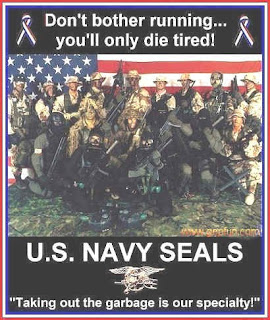 Well, today certainly ended as a good day for America and for the U.S. Navy, as Captain Phillips was rescued and the whole crew of the Maersk Alabama can now return home safely. It was a brazen act for pirates to attack a U.S. flagged vessel, and America had to send a strong message that such attacks on our merchant fleet will not be tolerated. And we sent that message today, with three of the pirates being taken out by our elite SEAL teams, and the fourth now in U.S. custody. It would have been an international embarrassment if 4 teenage pirates from Somalia could have seized a U.S. vessel, or received a ransom for having captured America sailors.
Well, today certainly ended as a good day for America and for the U.S. Navy, as Captain Phillips was rescued and the whole crew of the Maersk Alabama can now return home safely. It was a brazen act for pirates to attack a U.S. flagged vessel, and America had to send a strong message that such attacks on our merchant fleet will not be tolerated. And we sent that message today, with three of the pirates being taken out by our elite SEAL teams, and the fourth now in U.S. custody. It would have been an international embarrassment if 4 teenage pirates from Somalia could have seized a U.S. vessel, or received a ransom for having captured America sailors.For the most part, piracy on the high seas is seen as a law enforcement issue, like somebody robbing a store (one that just happens to be floating on the ocean). And unless the lives of our sailors are in danger, the rules of engagement generally prohibit trying to kill the pirates. I think this is an approach we may need to reconsider. Carl von Clausewitz, the famous military theorist, wrote of the rational calculus of war - the idea that countries weighed their war aims against the costs, and when the cost of continuing a war became greater than the gains to be achieved by winning it, they would terminate the conflict. On a smaller scale, we need to make the cost of piracy so high its no longer worth the risk. In an impoverished country such as Somalia, the money to be made from a single successful capture can be many lifetimes worth. But if a pirate knew that if he tried to seize a U.S. vessel he would be killed, no questions asked, its hard to imagine the risk still being worth it.
It's a difficult job for the U.S. Navy. There is a limited number of ships trying to cover an area of ocean over one million square miles. They can't protect every ship or every major route. But so long as they are in the area, able to get quickly to the scene of pirate attacks, they will continue to serve as a major deterrent in the region.
From a political standpoint, this is certainly a win for the Obama administration. It's interesting, though not really surprising, to note that he authorized the use of deadly force here. For days I had been hearing from my conservative friends about how Obama was too concerned with world opinion and making friends, and thus wouldn't allow the military to take necessary action here. One sent me a mocking e-mail about how Obama was willing to negotiate with "moderate pirates". But at the end of the day, he let the Navy do what they needed to do. And instead of negotiating with these thugs, we killed the pirates and freed our citizen.
Coincidentally, the destroyer that first arrived on the scene - the USS Bainbridge - was named for Commodore William Bainbridge, who fought Algerian pirates in the Barbary Wars of early 19th Century. I'm sure he would be very proud of the ship that bears his name, and the men who serve on it today.
I would think that deadly force would often, if not always, be appropriate against pirates. Folks on land can use deadly force when reasonably necessary to protect their lives from robbers and kidnappers, and it should be easier to escape from attackers on land -- where running raises less chance of drowning.
ReplyDeleteSounds to me like the people who were worried about Obama v. piracy are the same ones that bought a lifetime supply of ammunition because they're afraid he's going to take their guns away. Like these folks, from this story a week after the election:
http://www.cnn.com/2008/CRIME/11/11/obama.gun.sales/index.html
Or this recent one:
http://www.humanevents.com/article.php?id=31268
And, conservatives should be reminded that the French - yes, the French - have used their military forces to free 60 captives from the pirates (but unfortunately with some loss of life).
ReplyDelete